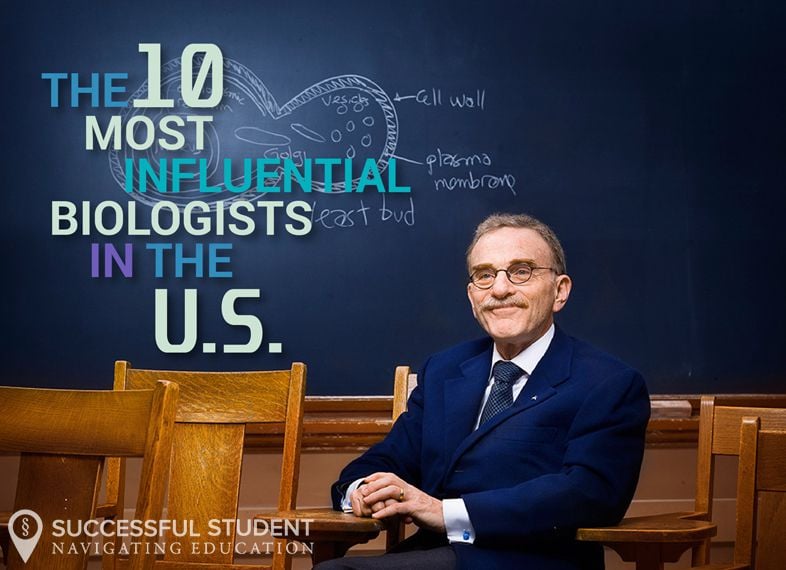The 10 Most Influential Biologists in the U.S. have advanced biological understanding and research in fields such as medicine, genetics, and evolution. These are the pioneers, the innovators, the academics pushing our understanding forward in many disciplines within Biology.
Their work has contributed to elevating our understanding of biology as a whole, but also to real-world advances in medicine, contributions towards curing disease, and other benefits to society.
Biology is one of the most exciting and dynamic fields in all of the natural sciences. It is a deep and vast discipline, whether studied on micro or macro levels.

The Most Influential Biologists in the U.S.
1. Jennifer Doudna: Biochemist
Education: Jennifer Doudna completed her Bachelor of Arts in Biochemistry from Pomona College, California. She then went on to Harvard Medical School where she graduated with a Ph.D. in Molecular Pharmacology and Biological Chemistry. She completed a post-doctoral fellow at the University of Colorado.
Brief Summary of Work: Doudna's first professorship was held at Yale University. Since 2002 she has held the position of Professor of Biochemistry and Molecular Biology at the University of California, Berkeley.
She achieved the title of Chancellor Chair for the Department as well. She has worked as a Howard Hughes Medical Investigator since 1997. Doudna co-discovered a genetic engineering technology known as CRISPR-Cas9 with scientist Emmanuelle Charpentier.
Both Doudna and Charpentier were recently awarded the Nobel Prize for their work on Crispr-Cas9. CRISPR is a genome editing method that has revolutionized the field of biology. Doudna is also a leader and advocate for the ethical implications of genome editing.
Notable Honors and Awards:
- Nobel Prize in Chemistry, 2020
- Wolf Prize in Medicine, 2020
- Kavli Prize, 2018
- NSF Alan T. Waterman Award, 2000
- Packard Foundation Fellow Award, 1996
2. Carolyn Bertozzi: Chemist
Education: Carolyn Bertozzi received her undergraduate Bachelor of Arts in Chemistry from Harvard. She went on to obtain her Ph.D. from the University of California at Berkeley. She also completed a postdoc in Immunology at the University of California, San Francisco.
Brief Summary of Work: Currently, Bertozzi works as professor and researcher at Stanford University in the School of Humanities. She is also a Howard Hughes Medical Institute Investigator. Her research focuses on surface sugars on cells. The research group under her direction is investigating:
"cell surface glycosylation associated with cancer, inflammation and bacterial infection, and uses this information to develop new diagnostic and therapeutic approaches".
She is credited with nearly 400 various publications, including journal articles and conference proceedings.
Notable Honors and Awards:
- MacArther Fellow, 1999
- Lemelson-MIT Prize, Massachusetts Institute of Technology, 2010
- Heinrich Wieland Prizel, 2012
- Ernest Orlando Lawrence Award, 2015
- National Academy of Sciences Award in the Chemical Sciences, 2016
- Arthur C. Cope Award, 2017
3. J. Craig Venter: Biochemist
Education: John Craig Venter received his Bachelor of Arts in biochemistry from the University of California, San Diego. He then completed a Ph.D. in Physiology and Pharmacology from the same school.
Brief Summary of Work: Venter worked on faculty at the State University of New York for eight years. He then moved on to work at the National Institutes of Health (NIH). Here, he developed a faster gene identification method using expressed sequence tags (ESTs). After eight years, he left the NIH to establish The Institute for Genomic Research (TIGR), a research arm of the Human Genome Sciences company.
At TIGR, Venter successfully completed the first complete sequence of a free-living organism. In 1998 Venter developed Celera Genomics. Venter then started work on human genome sequencing. In 2006 Venter established the J. Craig Venter Research Institute (JCVI). He is the author of over 280 articles.
Notable Honors and Awards:
- Paul Ehrlich and Ludwig Darmstaedter Prize, 2001
- Gairdner Foundation International Award, 2002
- United States National Medal of Science, 2008
- Edogawa-NICHE Prize, 2020
- King Faisal International Award for Science
4. Richard Lewontin: Evolutionary Biologist
Education: Richard Lewontin received his Bachelor of Science in Biology from Harvard College. He completed a Master's degree in Mathematical Statistics and a Ph.D in Zoology at Columbia University. He was a student of Theodosius Dobzhansky.
Brief Summary of Work: Lewontin held professorships at several Universities including University of Rochester, North Carolina State University, and University of Chicago. In 1973 he started a professorship at Harvard University and has remained there to this day, now working in an emeritus position. At Harvard he achieved the title of Alexander Agassiz Research Professor. He is best known for two significant publications: The Apportionment of Human Diversity and The Genetic Basis of Evolutionary Change.
These two works exemplify the work Lewontin achieved in developing molecular population genetics. Later in his career, Lewontin also made significant strides in challenging his fellow biologists and geneticists to think more holistically. His publications in this area include: Not in Our Genes, The Triple Helix: Gene, Organism, and Environment, and Biology as Ideology.
Notable Honors and Awards:
5. James D. Watson: Geneticist, Molecular Biologist, & Zoologist
Education: James D. Watson completed his Bachelor of Science in Zoology from the University of Chicago in 1947. He went on to complete a Ph.D. in 1950 in the same subject from Indiana University where he studied under Noble Laurette Hermann J. Muller.
Brief Summary of Work: Watson is best know for his co-discovery of the double helix structure of DNA with scientist Francis Crick in 1953. Watson has done research and/or taught at several schools including University of Cambridge, University of Copenhagen, and Harvard University. His book, Molecular Biology of the Gene, is one of the most widely used texts for biology students.
Watson was a leader in the Human Genome Project and director of the Laboratory of Quantitative Biology at Cold Spring Harbor in New York. Most recently in 2007 Watson made some controversial statements regarding intellectual differences among races that he believed to be based in genetics. He has since retired.
Notable Honors and Awards:
6. Edward O. Wilson: Biologist
Education: Edward Wilson received his Bachelor of Science and Master of Science in Biology from the University of Alabama. He completed his Ph.D. in Biology from Harvard University.
Brief Summary of Work: Wilson is University Professor Emeritus at Harvard University where he has been a professor since 1956. He is Honorary Curator of Entomology at the Museum of Comparative Zoology. He is known as a leader in the study of ants.
He also developed biological explanations for social behavior. Wilson proposed that evolution works to preserve the gene, not just the individual, thus giving an explanation for altruism. Wilson is credited as one of the creators of:
- Island Biogeography
- Sociobiology
- Biophilia
- Biodiversity studies
- Consilience
He is the author of several works including On Human Nature, The Ants, and The Diversity of Life. Wilson is also the recipient of over 100 awards and honors for his work.
Notable Honors and Awards:
- Crafoord Prize, 1990
- Harvard Society of Fellows
- U. S. National Medal of Science
- Two Pulitzer Prizes in non-fiction
7. Marcus Feldman: Evolutionary Biologist
Education: Marcus Feldman completed his Bachelor of Science in Mathematics and Statistics from the University of Western Australia. He received his Master of Science in Mathematics from Monash University, also in Australia. He completed his Ph.D. in Mathematical Biology at Stanford.
Brief Summary of Work: Feldman has been on the faculty at Stanford since 1971. He has achieved the title of Burnet C. and Mildred Finley Wohlford Professor of Biological Sciences. Feldman is also the Director of the Morrison Institute for Population and Resource Studies.
He is a well known evolutionary biologist who applies his mathematical background to the analysis of evolutionary processes. His work in evolution has lead to the development of the quantitative theory of cultural evolution. Feldman also has done extensive research into the gender ratio and consequent demographic issues in China. Feldman has published more than 650 research papers and several books.
Notable Honors and Awards:
- China Population Study Award, 1998
- "Paper of the Year 2002/2003," The Lancet (bibliography number 294)
- Dan David Laureate in Evolution, 2011
- Kimura Motoo Award in Human Evolution, 2016
- Allan V. Cox Medal for Fostering Undergraduate Research at Stanford, 2017
- Honorary Doctorates from The Hebrew University, 2005; Tel Aviv University, 2010; St. Andrews University, 2020
8. Randy Schekman: Cell Biologist
Education: Randy Schekman completed a Bachelor of Arts in Molecular Sciences from the University of California in Los Angeles. He went on to complete his Ph.D. in Biochemistry at Stanford University.
Brief Summary of Work: Schekman is the former Editor-in-Chief of Proceedings of the National Academy of Sciences. Since 1991 Schekman has been a Howard Hughes Medical Investigator. He is currently a professor and researcher at Berkeley. Schekman is best known for his contributions to the discovery of the cellular vesicle transport system.
His co-workers of this discovery were James Rothman and Thomas C. Sudhof. In 2011 Schekman was chosen as the first editor of the new open-access journal, eLife. The journal is a combined effort of the Max Planck Society, the Howard Hughes Medical Institute, and the Wellcome Trust. Most recently, Schekman has joined the Executive Leadership board of the group Aligning Science Across Parkinson's (ASAP) as the Scientific Director. ASAP aims to create multidisciplinary collaboration to research, improve treatments, and one day cure Parkinson's.
Notable Honors and Awards:
- Nobel Prize in Physiology or Medicine, 2013
- Albert Lasker Basic Medical Research Award, 2002
- National Academy of Sciences, 1992
- Gairdner International Award
9. Frances Arnold: Scientist and Engineer
Education: Frances Arnold received her Bachelor of Science in Mechanical and Aerospace Engineering from Princeton University. She went on to complete a Master of Science and Ph.D. in Chemical Engineering from the University of California, Berkeley.
Brief Summary of Work: Arnold started as a visiting Associate Professor at California Institute of Technology (CalTech) in 1986. She continued at CalTech and since then has achieved the title of Linus Pauling Professor of Chemical Engineering, Bioengineering, and Biochemistry. Arnold has also worked as the Director of the Rosen Bioengineering Center since 2013.
Arnold is best known for her work with directed enzyme evolution. She used the addition of random mutations to genetic code to create a more effective enzyme for catalyzing reactions.
Notable Honors and Awards:
- Nobel Prize in Chemistry, 2018
- Charles Stark Draper Prize, 2011
- National Medal of Technology and Innovation
10. George P. Smith: Biologist
Education: George Smith earned a Bachelor of Arts degree in Biology from Haverford College in Pennsylvania. He continue on to complete his Ph.D. in Bacteriology and Immunology from Harvard University. He completed post-doctoral research at the University of Wisconsin.
Brief Summary of Work: After his post-doctoral research, Smith taught as an assistant professor at the University of Missouri (Mizzou). Smith remained on staff at Mizzou for the whole of his career, achieving the title Curators' Distinguished Professor in 2000. Smith is best known for developing phage display.
This new laboratory technique became crucial in developing treatments for a variety of conditions including rheumatoid arthritis and inflammatory bowel disease. Smith also spent some time during his sabbatical at Duke University where he developed fusion proteins.
Notable Honors and Awards:
In determining this ranking of the most influential biologists in the U.S., we consulted AcademicInfluence.com's Influential People ranking tool. We selected the years 2010 - 2020, and narrowed the geographic area to the United States. For more ranking information, see our Rankings page.
